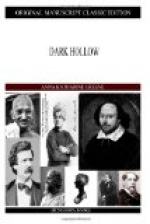There is one thing I did do, however. I made certain inquiries here and there, and soon satisfied myself as to how Scoville had been able to come into town, commit this horrid deed and escape without any one but myself being the wiser. Spencer and he had come from the west en route to New York without any intention of stopping off in Shelby. But once involved in play, they got so interested that when within a few miles of the town, Spencer proposed that they should leave the train and finish the game in his own house. Whether circumstances aided them, or Spencer took some extraordinary precautions against being recognised, will never be known. But certain it is that he escaped all observation at the station and even upon the road. When Scoville returned alone, the storm had reached such a height that the roads were deserted, and he, being an entire stranger here at that time, naturally attracted no attention, and so was able to slip away on the next train with just the drawback of buying a new ticket. I, a boy of fifteen, trespassing where I did not belong, was the only living witness of what had happened on this night of dreadful storm, in the house which was now a ruin.
I realised the unpleasantness of the position in which this put me, but not its responsibility. Scoville, ignorant that any other breast than his own held the secret of that hour of fierce temptation and murder, naturally scented no danger and rejoiced without stint in his new acquisition. What evil might I not draw down upon myself by disturbing him in it at this late day. If I were going to do anything, I should have done it at first—so I reasoned, and let the matter slide. I became interested in school and study, and the years passed and I had almost forgotten the occurrence, when suddenly the full remembrance came back upon me with a rush. A man—my father’s friend—was found murdered in sight of this spot of old-time horror, and Scoville was accused of the act.
I was older now and saw my fault in all its enormity. I was guilty of that crime—or so I felt in the first heat of my sorrow and despair. I may even have said so—in dreams or in some of my self-absorbed broodings. Though I certainly had not lifted the stick against Mr. Etheridge, I had left the hand free which did, and this was a sufficient occasion for remorse—or so I truly felt.
I was so affected by the thought that even my father, with his own weight of troubles, noticed my care-worn face and asked me for an explanation. But I held him off until the verdict was reached, and then I told him. I had not liked his looks for some time; they seemed to convey some doubt of the justice of this man’s sentence, and I felt that if he had such doubts, they might be eased by this certainty of Scoville’s murderous tendencies and unquestionable greed.
And they were; but as Scoville was already doomed, we decided that it was unnecessary to make public his past offences. However, with an eye upon future contingencies, my father exacted from me in writing this full account of my adventure, which with all the solemnity of an oath I here declare to be the true story of what befell me in the house called Spencer’s Folly, on the night of awful storm, September Eleventh, 1895.




